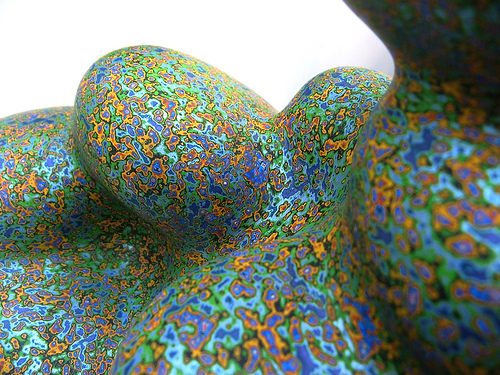“Since there is an infinite number of alternative universes, there must be one in which there isn’t an infinite number of alternative universes. Perhaps this is it.”
No, that speculation didn’t come from the “Ask Mr. Cosmology” mailbag. It’s from a reader of New Scientist, courtesy of LWON’s own Sally, who is an editor at the magazine. She forwarded it to me because, she said, “it kind of made my head asplode.” After receiving reassurances from her that her head hadn’t actually spontaneously detonated—this is, after all, someone who is capable of falling into the Thames without any help—I sat and thought and tried to find the flaw in the logic.
The speculation has a logical basis in the current standard cosmological model. According to quantum theory, virtual particles should be popping into and out of existence all the time—and are, as experiments have repeatedly shown over the past six decades. In that case, the universe could be the product of one such quantum pop.
If it is, then it could have gone through a process that physicists call a “phase transition” and that everyone else calls “the thing that happens when water turns into ice or vice versa.” At the age of a trillionth of a trillionth of a trillionth of one second—that’s a 1 followed by 36 zeros, or 1036—the universe would have expanded ten septillion-fold—or to 1025 times its previous size. And it would have done so over the course of 1/1035 seconds.
And if inflation can pop one quantum universe into existence, then why not many? In fact, according to quantum theory, it should. It would, if inflation actually happened.

The case for inflation isn’t airtight, but with every fresh observation of the Cosmic Microwave Background—the remnant echo of the Big Bang, loosely speaking—the evidence has looked better and better. Over the past decade, consensus has coalesced: We very likely did come from a quantum pop. In that case, our inflationary bubble would be one of an ensemble of 10500 universes. The number isn’t quite infinity, as the New Scientist reader suggests, but who’s counting?
Still, let’s say the number of universes is infinite. In that case, the reader’s argument goes like so:
A. The number of universes is infinite.
B. A universe exists in which the number of universes is not infinite.
C. This might be it.
When the argument is stated this starkly, the flaw in the logic becomes pretty clear. B contradicts A. “The number of universes is infinite” and “the number of universes is not infinite” can’t both be true. The contradiction, however, is obscured by the inclusion of “A universe exists in which.” The implication is that there’s something special about universes, something that, for instance, doorknobs don’t have. “Since there is an infinite number of doorknobs, there must be one for which there isn’t an infinite number of doorknobs” wouldn’t make anyone’s head asplode, except perhaps in bewilderment.
So what’s so special about universes that the existence of an infinite number of them would, for physics-savvy readers, somehow seem to suggest the necessary existence of one that allows the impossible?
I suspect the answer is quantum probability. According to quantum theory, everything is a matter of probability; therefore anything is possible. Anything. The probability that a butterfly will give birth to a dragon or that I will one day fall into the Thames is vanishingly small—but, technically, it’s not zero. Same with the emergence of a universe, or a cornucopia of universes, from nothing. The laws of physics allow it.
And that’s the implicit, but missing, “something special” in premise B: the laws of physics. As in “A universe exists in which the laws of physics require the number of universes to not be infinite.” What prompted the New Scientist reader, and what posed a threat to Sally’s noggin, was an unthinking assumption: that “the laws of physics”—in particular quantum theory—are part of the argument.
It’s a tempting assumption. According to current cosmological thinking, if an infinite ensemble of (or 10500, anyway) universes exists, then presumably each could come equipped with its own laws of physics. So couldn’t our universe be the one in which the laws of physics require that other universes don’t exist?
Yes—but only if our laws of physics have something to do with the other universes. We all, however, went our separate ways 13.7 billion years ago. Our laws of physics affect what happens within our universe, but there’s no reason to think they would influence the multiverse at large. Doorknobs, after all, don’t dictate the laws of physics.
Still, if they did, then maybe we could reframe the New Scientist‘s reader’s comment:
“Since there is an infinite number of alternative universes, there must be one in which there is just one alternative universe. Perhaps this is it.”
“Since there is an infinite number of alternative universes, there must be one in which there are two alternative universes. Perhaps this is it.”
“Since there is an infinite number of alternative universes, there must be one in which there are 2,125,179,218 alternative universes. Perhaps this is it.”
Memo to New Scientist staff: You can remove your plastic ponchos now.
* * *
Images: PhOtOnQuAnTiQuE via Flickr; cheesepopcorn.org

I love the way you unpacked this, Richard!
Now I’m going to read it again…
I know, Jessa. I’m having the same reaction.
There is another hidden assumption. The reader assumes that in an infinite number of universes, with an infinite number of possibilities, all possibilities must occur in at least one universe. This is not necessarily true. There _could_ be a universe exactly like ours but in which my given name is Jorge Luis, but there doesn’t have to be. There could be an infinite number of universes, only one of which contains any people at all, and the others just have a infinite variety of different balls of gas and rocks.
This actually gets close to a mathematical point about the dimensionality of infinities. Even if they all had roughly the same physical laws, the dimensionality of the number of universes might be lower than the dimensionality of the ways to arrange the atoms in those universes, which would mean that they couldn’t explore all possibilities. This is above my pay grade.
“This is above my pay grade.” Mine, too!
Seriously, thanks for writing.
Fantastically mind-twitching. Adding a whole new twist to my “fictional” not-necessarily-fiction. Cool!
As alluded to by Ben above, the ‘paradox’ relies on confusion between an _infinite_ set and an _exhaustive_ set. The set of odd numbers is infinite – that doesn’t mean it has to contain an even number.
Thanks, Graham. For anyone who wants other explorations of the logic (or illogic) behind the question, a vibrant comments thread has opened at io9.com, which graciously re-posted my article: http://io9.com/5901409/whats-in-a-number-unravelling-a-multiversal-paradox
Good article but the thinking is still quite small. There are actually 10×500 zillion multiversus give or take. Omniverses are up there too.